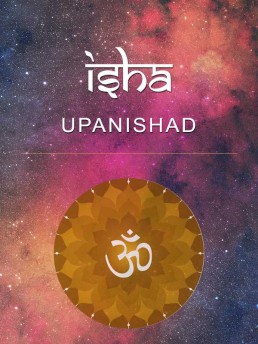ओं । क्रतो स्मर कृतं स्मर क्रतो स्मर कृतं स्मर ॥ १७ ॥
oṃ | krato smara kṛtaṃ smara krato smara kṛtaṃ smara || 17 ||
वायुः (vāyuḥ) – air (prāṇa)
अनिलम् (anilam) – to the air (universal)
अमृतम् (amṛtam) – immortal
अथ (atha) – now
इदम् (idam) – this
भस्मान्तग्म् (bhasmāntagm) – reduced to ashes
शरीरम् (śarīram) – body
ॐ (oṃ) – Om (prolonged sound)
क्रतो (krato) – O my mind
स्मर (smara) – (you) remember
कृतग्म् (kṛtagm) – what you did, your deeds
स्मर (smara) – (you) remember
क्रतो (krato) – O my mind
स्मर (smara) – (you) remember
कृतग्म् (kṛtagm) – what you did, your deeds
स्मर (smara) – (you) remember
Isha Upanishad Home
Isha – Sri Shankara’s Introduction
Isha – Invocation
Isha – 1-īśāvāsyamidaṃ sarvaṃ
Isha – 2-kurvanneveha karmāṇi
Isha – 3-asuryā nāma te lokā
Isha – 4-anejadekaṃ manaso
Isha – 5-tadejati tannaijati
Isha – 6-yastu sarvāṇi
Isha – 7-yasminsarvāṇi bhūtāny
Isha – 8-sa paryagāc chukram
Isha – 9-andhantamaḥ praviśanti
Isha – 10-anyad evāhur vidyayā
Isha – 11-vidyāṁ cāvidyāṁ ca
Isha – 12-andhaṁ tamaḥ praviśanti
Isha – 13-anyad evahūḥ
Isha – 14-sambhūtiṁ ca vināśaṁ
Isha – 15-hiraṇmayena pātreṇa
Isha – 16-pūṣann ekarṣe yama
Isha – 17-vāyur anilam amṛtam
Isha – 18-agne naya supathā

Commentary by Swami Sivananda
The dying man, who has led a virtuous life, who has done holy works, by remembering his actions gets bliss in the next world. He says: ‘Let my Prana leave this body and join the all-pervading Sutratman.” Krato-vocative case-means ‘O mind!’ Uvata, in his commentary, holds that Agni, Fire, who has been worshipped in youth and manhood is here invoked in the form of mind or that Kratu means sacrificial Fire. Remember! Remember my deeds. Remember all Karmas which I have done from childhood.’ The repetition of the same words Krato smara denotes anxiety or uneasiness of mind.
Ishavasya Upanishad – Verse 17 – Isha – 17-vāyur anilam amṛtam – In Sanskrit with English Transliteration, Meaning and Commentary by Adi Shankaracharya (Sankara Bhashya) and Swami Sivananda – Ishavasya-17

Commentary by Sri Adi Sankaracharya – Translated in English
Now, as I am dying, let my Prana leave its confinement within this body and join the all-pervading godly form of Air, i.e., the Sutratman. The word ‘reach’ should be supplied to complete the sentence. The idea ‘Let my Linga Sarira or subtle body purified by knowledge and Karma ascend’ must be supplied in virtue of the fact of the speaker entreating a passage. Let this body given as an oblation to the fire be reduced to ashes. Om, according to the forms of worship being a pratika (substitute) of the nature of the True and called Agni is mentioned as the same as Brahman. ‘Krato,’ vocative case, meaning ‘O mind whose characteristic is volition,’ ‘Remember’ i.e., time has come for me to remember what I should. Remember all that I have till now thought of ‘O Agni, remember what I have done’ i.e., remember all Karma which I have done from childhood. The repetition of the same words ‘Krito Sinara’ &c., expresses solicitude.